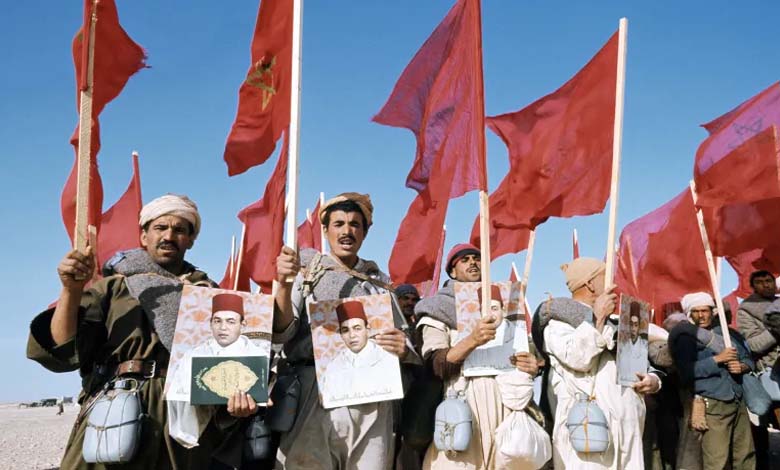From a National Epic to an International Victory: 50 Years of the Green March in Morocco

From a symbol of liberation to a path of development, Morocco celebrates today the fiftieth anniversary of the Green March, an event that remains a defining moment in the nation’s modern history.
-
Morocco Consolidates the Realism of the Solution: The UN Security Council Resolution Marks a Turning Point in the Moroccan Sahara Issue
-
From Backroom Diplomacy to the Voting Floor: How Morocco Won the UN Security Council Battle Over the Moroccan Sahara
On November 5, 1975, from the city of Agadir, the late King Hassan II announced the launch of a peaceful march toward Morocco’s southern provinces, calling on citizens to move nonviolently to reclaim their lands from Spanish occupation. In a historic speech, he told his people: “Tomorrow, November 6, you shall cross the borders. Tomorrow, you shall walk on your land, touch your sand, and kiss the soil of your beloved homeland.”
The King’s call sparked unprecedented national enthusiasm. Nearly 350,000 volunteers from across Morocco joined the movement, making it the largest peaceful march in the nation’s history since independence. Notably, 10 percent of the participants were women, reflecting the King’s desire to ensure meaningful female participation in this patriotic endeavor.
-
King Mohammed VI welcomes UN Security Council decision: The time of a unified Morocco has come
-
The UN Security Council supports Morocco’s autonomy plan for Moroccan Sahara
The volunteers traveled to the Moroccan Sahara by train, bus, and truck, carrying national flags and copies of the Quran instead of weapons. They were accompanied by doctors, nurses, auxiliary forces, and members of the gendarmerie, all ensuring safety and organization. Delegations from several Arab and Islamic countries also joined symbolically, expressing solidarity with the Moroccan cause.
This massive, peaceful mobilization compelled Spain to negotiate, resulting in the Madrid Agreement signed on November 14, 1975, later endorsed by the United Nations General Assembly. This agreement marked the beginning of a new phase in consolidating Morocco’s sovereignty over its southern territories.
-
Paraguay Demonstrates Its Support for Morocco’s Sovereignty over the Sahara by Opening a Consulate in the Southern Provinces
-
King Mohammed VI’s Vision: Morocco’s Rise through Justice and Balance
The march was called “Green” because it was entirely peaceful and imbued with spiritual symbolism: no weapons were carried—only Qurans and flags—making it a demonstration of faith, unity, and national pride.
Fifty years later, the Green March has evolved from a liberation movement into a long-term national development strategy. What began as a struggle for territorial recovery has become a comprehensive state policy focusing on regional growth, infrastructure, renewable energy, education, healthcare, and industrial investment.
-
The World Bank chooses Morocco as a regional headquarters for its stability and strong economy
-
Washington urges U.S. companies to invest in Morocco’s Sahara
As King Mohammed VI stated in his 2020 address marking the 45th anniversary of the Green March: “The Green March is not merely a landmark in the completion of our territorial integrity; it is a renewed and continuous march to strengthen the Moroccan identity of the Sahara internationally and make it a driver of regional and continental development.”
The Monarch has maintained his personal commitment to the southern provinces through multiple visits to Laâyoune, Dakhla, and other cities, launching ambitious projects aimed at transforming the region into a model of stability and prosperity.
-
New Diplomatic Achievement for Morocco with Its Election as Vice-President of the Conference on Landlocked Developing Countries
-
26th Anniversary of the Throne Day in Morocco: Diplomacy of Empowerment and Balance
In one of his speeches, King Mohammed VI affirmed: “Morocco, steadfast on its land and confident in its sovereignty, will continue its comprehensive development of the Saharan provinces, relying on democracy, advanced regionalization, decentralization, and the strongest bonds of national unity and sovereignty.”
On this anniversary, Moroccans remember a timeless national epic that united the people to achieve territorial integrity and complete national sovereignty. As Moha Aït Lahcen, a participant from Ouarzazate, recalled: “All marchers answered King Hassan II’s call with determination to reclaim the Saharan provinces.” He added: “Before the Green March, the Sahara was isolated and underdeveloped. Today, it stands as a model of growth and stability.”
-
Portuguese support for Morocco’s Sahara plan strengthens the Kingdom’s position
-
France Turns Words into Action in Support of Morocco’s Sovereignty Over the Sahara
Half a century later, Moroccans continue to celebrate this historic triumph, now reinforced by the United Nations Security Council’s endorsement of Morocco’s autonomy plan for the Sahara.
Just last week, the Security Council voted in favor of Morocco’s autonomy proposal, urging all parties to engage in negotiations based on this initiative, first presented by Morocco to the UN in 2007. The resolution confirms Morocco’s plan as the sole credible basis for dialogue, marking the international consecration of a journey that began fifty years ago—one of peace, sovereignty, and lasting progress.
-
Morocco Affirms Its Role as a Neutral Mediator in Sub-Saharan African Crises
-
Morocco’s Atlantic Project: A Lifeline from Crisis for Sahel Countries












